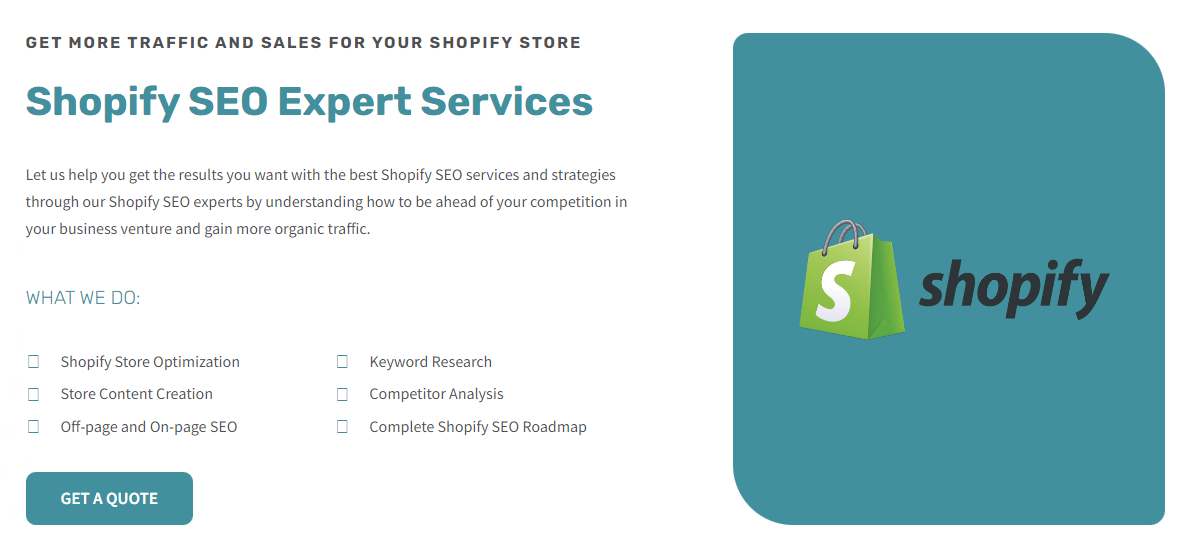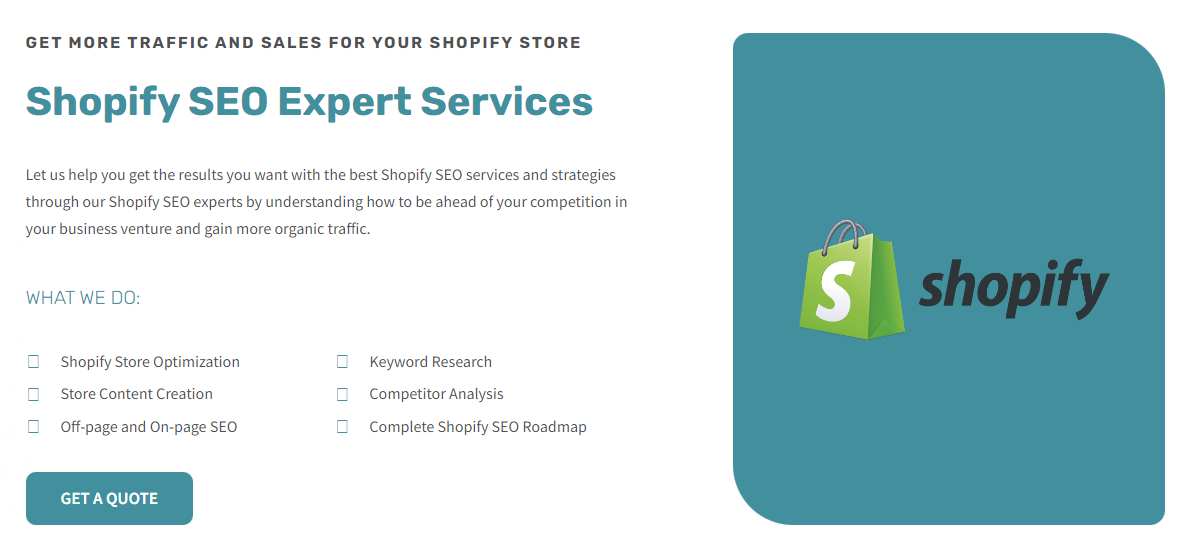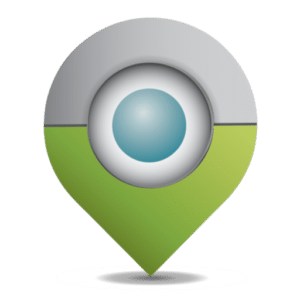Creating compelling meta titles and descriptions for your Shopify SEO website is essential to driving organic traffic to your store. Through effectively optimizing these elements, you can increase the visibility of your website in search engine results pages (SERPs). Meta titles are one of the first things a user will see when browsing through SERP results, and having a well-crafted title can entice them to click on your page.
Similarly, meta descriptions provide users with more information about the content on your page and can encourage them to click through. Optimizing both these elements is an important part of improving SEO performance and increasing organic traffic. This blog post will discuss the strategies businesses should use when crafting compelling meta titles and descriptions for their Shopify websites.
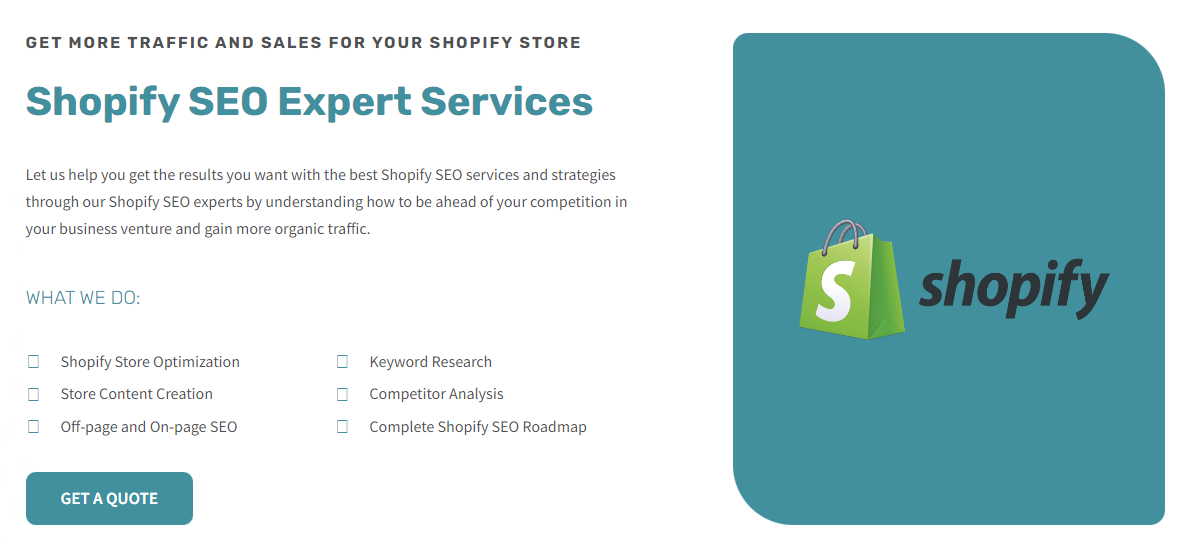
How to Write Effective Meta Titles and Descriptions for Shopify SEO?
Writing compelling meta titles and description is an essential part of SEO for Shopify. Meta titles and descriptions are HTML tags that briefly summarize your web page’s content to search engines and users. Here are some tips on how to write effective meta titles and descriptions for Shopify SEO:
- Use Target Keywords: Include your target keywords in your meta titles and descriptions to make them more relevant to search engine queries. This helps search engines understand the content of your web page and can improve your search engine rankings.
- Keep it Concise: Meta titles should be 60 characters or less, and meta descriptions should be 160 or less. This ensures that your titles and descriptions appear in search results without being cut off, making them easier for users to read and understand.
- Be Descriptive: Meta titles and descriptions should accurately reflect the content of your web page. Use descriptive language to give users a clear idea of what they can expect on your page.
- Use Action-Oriented Language: Use action-oriented language to encourage users to click on your web page in search results. Use phrases like “Shop Now” or “Learn More” to entice users to visit your page or ecommerce store.
- Use Unique Titles and Descriptions: Avoid duplicating meta titles and descriptions across your Shopify store. Use unique titles and descriptions for each page to ensure search engines can differentiate between them and rank them appropriately.
- Test and Refine: Regularly test and refine your meta titles and descriptions to optimize them for search engine rankings and user engagement. Use tools like Google Search Console, ecommerce website builders to monitor your performance and adjust as needed.
Crafting Click-Worthy Meta Tags for Your Shopify Store
Crafting click-worthy meta tags for your own Shopify store is crucial to optimizing your website for search engine results pages (SERPs) with Shopify SEO expert. Meta tags are the title and descriptions that appear on SERP listings and help users internalize what the page is about. Therefore, it’s important to craft titles and descriptions that accurately convey the content on the page, while also being enticing enough to make users want to click through.
By effectively optimizing meta tags, businesses can improve their organic reach, website templates and drive more traffic to their websites. This article will discuss some key tips for crafting compelling meta titles and descriptions for Shopify stores.
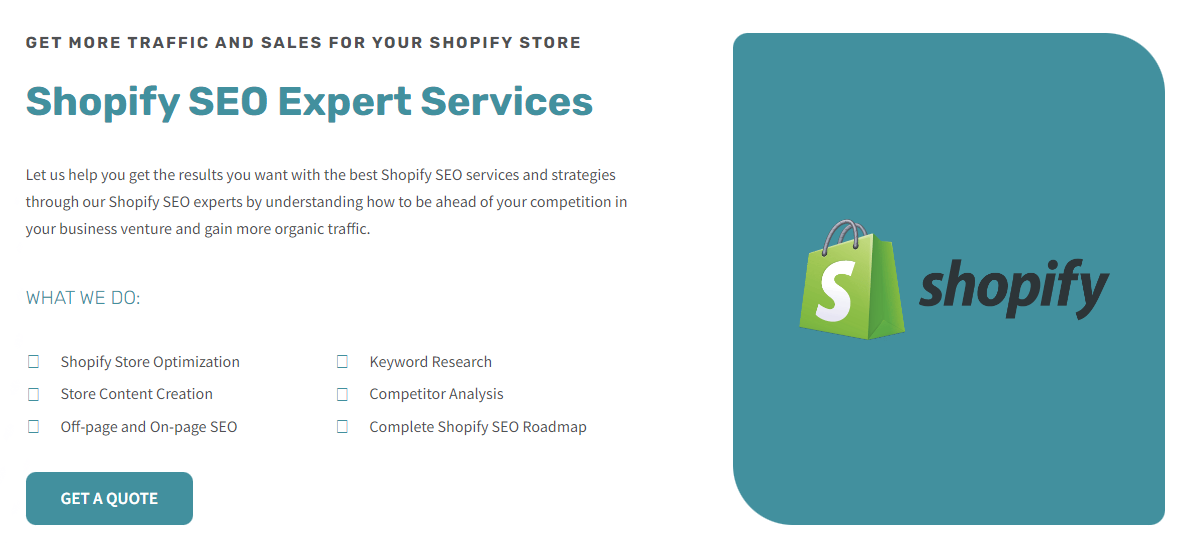
The Art of Creating Eye-Catching Meta Titles and Descriptions for Shopify
Use Eye-Catching Language: Use language that grabs the user’s attention and entices them to click on your web page. Use phrases like “Limited Time Offer,” “Exclusive Discount,” or “New Arrival” to pique their interest.
Highlight Unique Selling Points: Use your meta titles and descriptions to highlight your unique selling points. This can include your products’ features, benefits, or the problem they solve. By highlighting what makes your products stand out, you can differentiate yourself from competitors and attract more customers.
Keep it Short and Sweet: As mentioned earlier, meta titles should be 60 characters or less, and meta descriptions should be 160 or less. This is because search engines only display a certain number of characters in search results, and longer titles or descriptions may get cut off. Keep your titles and descriptions concise, clear, and to the point then start selling online.
Use Targeted Keywords: Include your keywords in your meta titles and descriptions to make them more relevant to search engine queries. This helps search engines understand the content of your web page and can improve your search engine rankings.
Use Power Words: Power words evoke emotions and create a sense of urgency or excitement. Use powerful words like “amazing,” “revolutionary,” or “mind-blowing” to create an emotional connection with users and make your products more appealing.
Test and Refine: Regularly refine your meta titles and descriptions to optimize them for search engine rankings and user engagement. Use tools like Google Search Console to monitor your performance and adjust as needed of custom domain.
Using these tips, you can create eye-catching meta titles and descriptions that attract more users to your Shopify store and improve your search engine rankings. Remember to keep them short, targeted, and compelling; always test and refine to find what works best for your business and better with Shopify experts SEO.
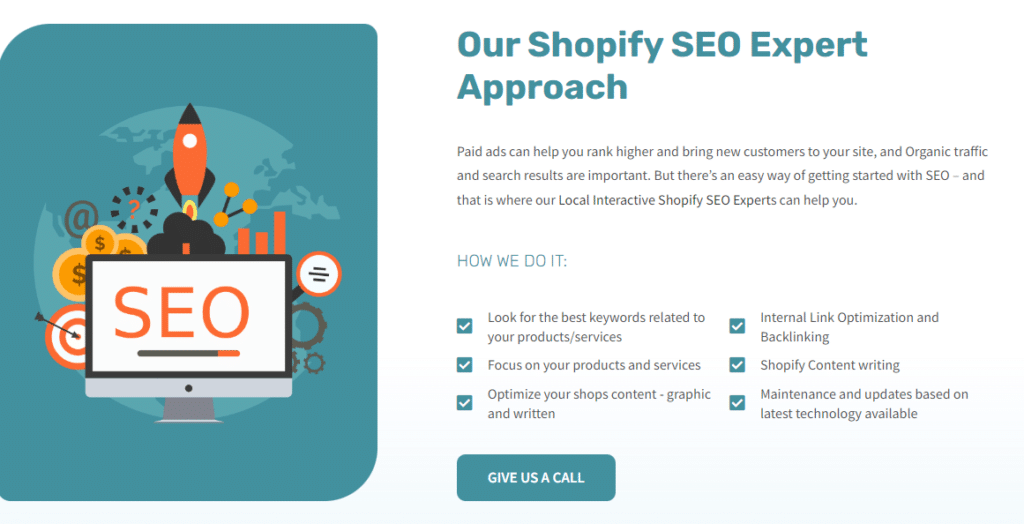
Optimizing Your Shopify Site with Engaging Meta Tags
Optimizing your Shopify site with engaging meta tags is essential for driving greater visibility in SERPs. Meta titles and descriptions are the first things a user notices when scanning through SERP results and can be powerful drivers to click-throughs.
Creating well-crafted tags requires keyword optimization, accurate descriptions of the web page content and creativity.
By optimizing each element, businesses can gain higher organic reach and drive more traffic to their Shopify website examples. This article will discuss key strategies for improving your Shopify store with engaging meta tags with SEO services.
Best Practices for Writing Meta Titles and Descriptions for Shopify
When it comes to writing meta titles and descriptions for Shopify SEO services, there are some best practices that you should follow to ensure that your titles and descriptions are both optimized for search engines and appealing to users. Here are some of the best practices for writing meta titles and descriptions for Shopify SEO:
- Keep it Relevant: Make sure that your meta titles and descriptions accurately reflect the content of your web page. This helps search engines understand the purpose of your page and ensures that users are not misled or disappointed when they visit your page.
- Use Targeted Keywords: Include your keywords in your meta titles and descriptions to make them more relevant to search engine queries. This helps search engines understand the content of your web page and can improve your search engine rankings.
- Be Clear and Concise: Keep your meta titles and descriptions short and concise. Meta titles should be 60 characters or less, and meta descriptions should be 160 characters or less. This ensures that your titles and descriptions appear in search results without being cut off, making them easier for users to read and understand.
- Use Action-Oriented Language: Use action-oriented language to encourage users to click on your web page in search results. Use phrases like “Shop Now” or “Learn More” to entice users to visit your page.
- Avoid Duplicates: Avoid duplicating meta titles and descriptions across your best Shopify stores. Use unique titles and descriptions for each page to ensure search engines can differentiate between them and rank them appropriately.
- Test and Refine: Regularly test and refine your meta titles and descriptions to optimize them for search engine rankings and user engagement. Use tools like Google Search Console to monitor your performance and adjust as needed.
Why Meta Tags Matter for Shopify SEO: Tips for Creating Great Ones
Meta tags are an essential part of Shopify SEO. They provide search engines with information about the content of your web pages and help improve your own website search engine rankings. Here are some reasons why meta tags matter for Shopify SEO and tips for creating great ones:
- Improve Search Engine Rankings: Meta tags help search engines understand the content of your web pages and can improve your search engine rankings. Including relevant keywords in your meta tags makes it easier for search engines to index your pages and rank them higher in search results.
- Attract More Clicks: Well-crafted meta tags can also help attract more clicks from users in search results. Using descriptive and compelling language in your meta titles and descriptions can entice users to click on your web pages.
- Increase User Engagement: Meta tags can also help increase user engagement by giving users a clear idea of what to expect when they visit your web pages. This can reduce bounce rates and increase the time users spend on your website.
Tips for Creating Great Meta Tags for Shopify SEO:
- Research Your Keywords: Use keyword research tools to identify relevant keywords for your web pages. Use these keywords in your meta tags to improve your search engine rankings.
- Keep it Short and Sweet: Meta titles should be 60 characters or less, and meta descriptions should be 160 or less. Keep your meta tags concise, clear, and to the point. Free themes or premium themes as Shopify offers for marketing emails and part of homepage features for target audience.
- Use Descriptive Language: Use descriptive language in your meta titles and descriptions to give users a clear idea of what to expect when visiting your web pages. This can help attract more clicks and reduce bounce rates free domain business model.
- Avoid Duplicates: Avoid duplicating meta tags across your Shopify store. Use unique meta tags for each web page to ensure search engines can differentiate between them.
- Test and Refine: Regularly test and refine your meta tags to optimize them for search engine rankings and user engagement. Use tools like Google Search Console to monitor your performance and adjust as needed by small business owners.
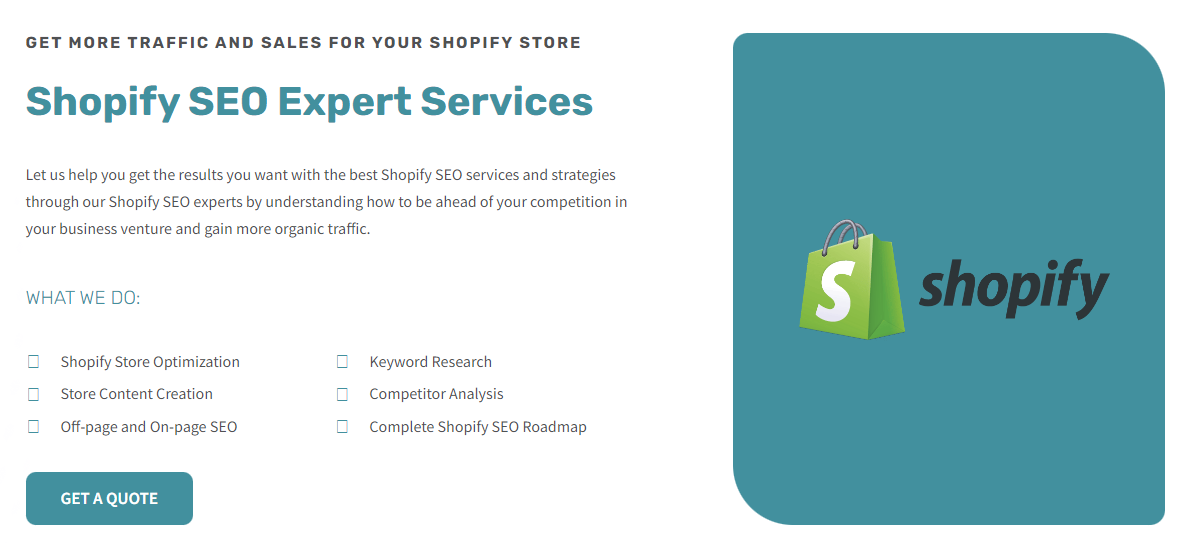
How to Use Meta Titles and Descriptions to Boost Shopify Sales?
Using meta titles and descriptions to boost the best Shopify SEO for sales is a great way to increase organic reach and drive more traffic to your website. Crafting compelling titles and reports can be the difference between users clicking through or not, so spending time optimizing these elements is important. By combining keyword optimization, accurate page descriptions and creative elements, businesses can ensure their tags are attractive enough for users to click through. In this article, we will discuss some key tips for crafting compelling meta tags that can help boost Shopify sales.
The Importance of Meta Tags in Shopify: Strategies for Writing Them
Writing effective meta tags is crucial for optimizing a Shopify store’s organic visibility and driving more traffic to the website. Meta titles and descriptions can be critical drivers in SERPs, as they’re the first things users notice when scanning results. Crafting compelling tags requires combining keyword optimization, accurate page descriptions, and creativity – all of which are important elements to increase clicks throughs. In this article, we will discuss the importance of meta tags in Shopify, as well as some strategies for writing them.
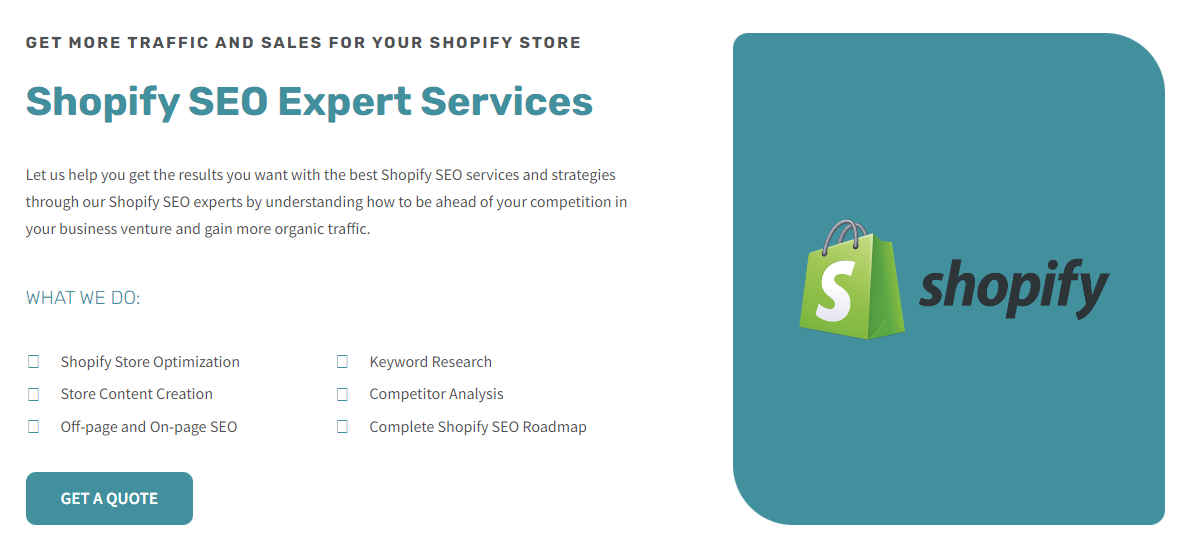
Maximizing Your Shopify SEO with Compelling Meta Titles and Descriptions
Maximizing your Shopify SEO requires more than creating high-quality content and optimizing your website’s structure. Meta titles and descriptions are crucial to your SEO strategy as they can greatly impact your click-through rates and search engine rankings. Compelling meta titles and descriptions can entice users to click on your website, increasing traffic, engagement, and conversions.
One of the most effective ways to create compelling meta titles and descriptions is by using descriptive language that accurately reflects the content of your web pages. By including relevant keywords and phrases in your meta tags, you can help search engines understand the content of your website and rank your pages higher in search results. Additionally, using action-oriented language in your meta titles and descriptions can encourage users to take action and click through to your website.
Another key factor to consider when optimizing your meta titles and descriptions is their length. Meta titles should be 60 or less, while meta descriptions should be 160 or less. Keeping your meta tags concise and to the point can help improve your click-through rates and ensure that users clearly understand what to expect when they visit your website. Maximizing your Shopify SEO with compelling meta titles and descriptions can improve your website’s visibility, customer experience and attract more traffic and sales to your online store.

